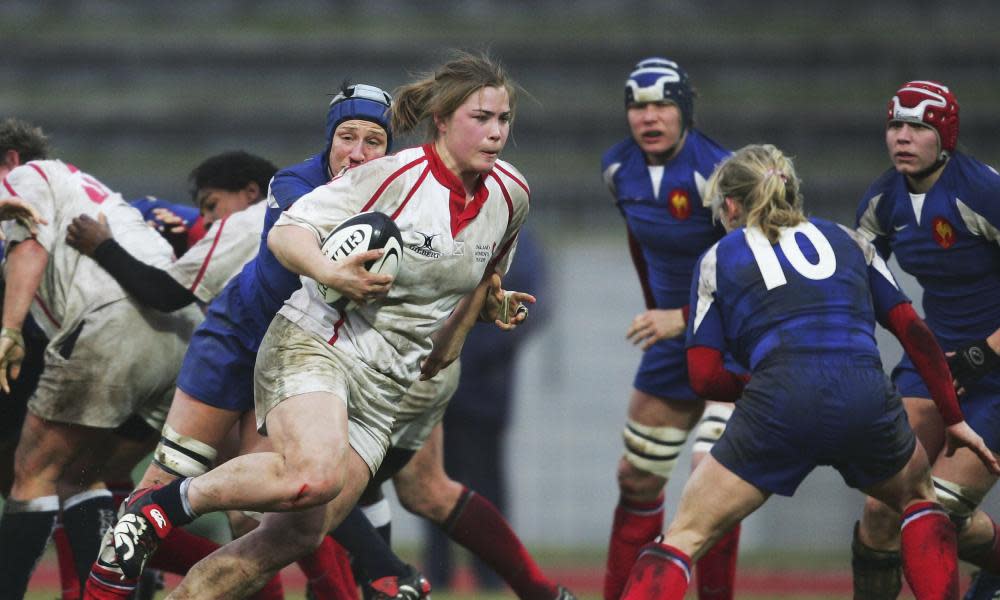Former England rugby captain: 'I feel we are in the shadows of the men'

Even now there are days when Catherine Spencer looks back with a mixture of incredulity and anger. “I felt like a second-class citizen for most of my rugby life,” she says flatly, recalling her time as one of England’s most prominent women’s rugby players. “Even when I did interviews as England captain I felt I was having to say thank you for the smallest things and be overly grateful. I want people now to understand their value.”
Spencer, now 40, is no longer playing for her country but, from where she sits, looking after her nine-month-old daughter, Mae, not a great deal has changed. Everyone is aware England’s men are due to be playing Ireland at Twickenham this Sunday. Rather less of the marketing budget has been spent on promoting the women’s Six Nations fixture between the same countries in Doncaster on the same day. The latter fixture is due to kick off at 12.45pm, just when most TV viewers are either en route to the men’s game or thinking about their lunch.
It is just another snapshot of the daily battles still faced by rugby’s warrior women. There is no prize money in the women’s Six Nations and Spencer’s sense of inequality – “I feel we are in the shadows of the men” – is easy to understand. With the gap widening between the centrally contracted England side and some of their less well-funded Celtic neighbours she also argues the women’s tournament could do with a radical makeover. “As much as this might not be a popular view I think we need to break away. It’s a tournament that’s steeped in history and always gets the juices flowing. I hope it remains that way but I think it’s thwarting our development a little bit.
Related: James Haskell: 'When you’re being choked in the MMA cage it’s horrific' | Donald McRae
“We don’t have to do what the men are doing. We need to do what’s right for our game. It either needs to be fully integrated – we play at the same stadiums at the same times with more resources to market the games and more media attention – or we go the other way and maybe have two divisions and teams like Spain involved.”
With the biggest women’s clash – France v England – having already taken place in round one, this delicate debate could yet overshadow the remainder of the competition. Should the women’s game be structured in the same traditional way simply because that is how the men have always preferred it? How much more media attention and extra fans would it win if, for example, it were scheduled on the men’s “fallow” weekends?
In Spencer’s experience “double headers” are not always the answer. “When the women have played after the men at Twickenham, the men are all in their dinner gear getting ready for the post-match function. Sometimes we were not even on the ticket. I remember someone from a women’s magazine coming to watch our game after the men at Twickenham and having real problems getting into the stadium. The stewards didn’t even know the women’s game was happening. I’m not saying that’s happening now but I think it is to a certain extent.”
At least those in charge of the game’s future direction now have a decent handbook. Having played 63 times for England, captained her country and featured in two World Cup finals, Spencer has written an honest, revealing and trail-blazing book – Mud, Maul, Mascara – which should be required reading for anyone whose knowledge of women’s rugby might need expanding.
The positive response has encouraged her to believe times may finally be changing. “I don’t think there would have been such a good reaction even five years ago. I think that demonstrates where the sport is going but it still needs to go further.” When it comes to promoting the women’s game she believes the volume needs turning up: “We should be shouting from the rooftops about it. We should be saying to everyone: ‘It’s OK to be a woman and play sport. It’s OK to be female and strong. It’s OK to be a woman and play rugby.’”

Increasing crowds is the next step but Spencer, whose company Inspiring Women also seeks to promote female leadership, is not among those who believe playing with a slightly smaller ball would help. “I’m a supporter of keeping it the same size. The amount of times people say to women’s players: ‘Do you tackle? Is it the same size pitch?’ To be able to say ‘Yeah, it’s exactly the same sport’ is really important. There are some male players who probably have smaller hands than some female players. Let’s not meddle too much.”
Spencer has long been accustomed to giving the men a run for their money, not least when she used the same gym in Bath as several men’s players. As the former Bath and South Africa fly-half Butch James once said: ‘I’m going back to the coffee shop. I ain’t squatting until she’s gone.’ So believe her when she questions World Rugby’s decision to remove the word ‘Women’s’ from the title of the next female World Cup in 2021– “We’re not yet at a stage where we’re ready to take that word away” – and go and read her book. “There are so many male rugby books out there. I hope this encourages other females to start writing. Although not just yet; we need to give mine a bit more time to sell!” Every word, rest assured, has come from the heart.
Tiers for souvenirs
Well done to the International Rugby Players who have publicly set out their principles amid the debate over the shape of a future global season. Top of the list is “more meaningful matches for emerging nations with a view to removing the current tier system and allowing the game to grow”. The Tier One and Tier Two pigeon-holes belong to a different era, as Japan spectacularly outlined at the World Cup, and the world’s leading players have a better idea than most about what else needs addressing. “We’re against anything that burns players out, excludes emerging nations and doesn’t grow the game,” said the World Player of the Year, Pieter-Steph Du Toit, neatly summing up the situation. More power to his already strong elbow.
One to watch
Away wins are usually at a premium in the Six Nations, which makes this middle championship weekend particularly intriguing. Ireland, France and Scotland will travel to London, Cardiff and Rome respectively feeling quietly optimistic if they can impose themselves early; if they are all successful it will make the tournament a two-horse race between France and Ireland who collide in the final fixture on the final weekend. For England, in particular, this feels like the game that will define their campaign.


